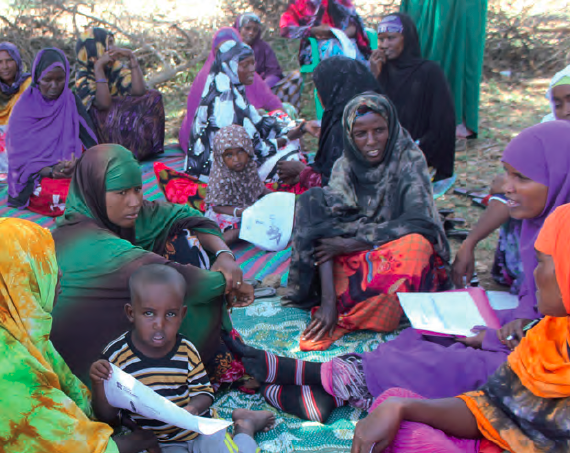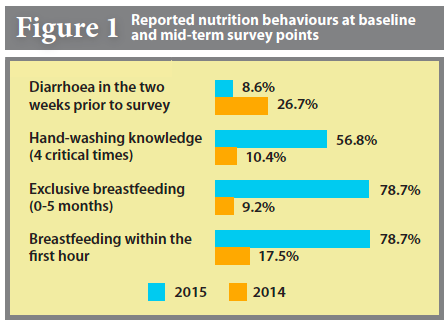Improving nutrition behaviours through a Care Group Model project in Somalia
 Halima Hillowis a nutritionist working in Somalia with World Concern. She has a degree in Food and Nutrition from the Ahfad University of Women in Sudan and is currently writing her Masters thesis in Public Health at Kenyatta University, Kenya.
Halima Hillowis a nutritionist working in Somalia with World Concern. She has a degree in Food and Nutrition from the Ahfad University of Women in Sudan and is currently writing her Masters thesis in Public Health at Kenyatta University, Kenya.
Ceel Afweyn District is in the northern Sanaag region of Somaliland with a population of over 117,000. The topography is a combination of mountainous and flat areas and the population is traditionally pastoral, although since the severe drought of 2011 some have moved into other livelihoods, such as commerce and starting small village shops. Access to healthcare services is limited, with only one well functioning maternal and child health (MCH) centre and two smaller health posts managed by auxiliary nurses with the capacity to treat only minor, common illnesses. The roads are poor and largely inaccessible during the rainy season, further limiting access to markets and the MCH centre.
World Concern1 is implementing a two-year nutrition project in nine villages (total population 12,600) in the district. The project aims to prevent malnutrition in children under five years of age and in pregnant and lactating women. Wasting levels are high at around 10% in the project area. The project objectives are to:
(i) Improve infant and young child feeding (IYCF) practices;
(ii) Improve maternal nutrition and health care; and
(iii) Improve hygiene and sanitation (personal, food and environmental) and utilisation of safe water.
Baseline, mid-term and end-line evaluations have been designed into the project, which includes measuring nutritional status in the project area as well as underlying causal factors.
The project is focused on promoting behaviour change through the Care Group model2, which aims to create individual and community behaviour change in health, nutrition and hygiene. This model was chosen based on its success in other countries and its focus on simple messaging to mothers.
Eighteen Care Groups were established across the nine villages. The groups were led by nine Health Promoters (HPs) and supported by 248 Care Group Volunteers (CGVs), selected by community members and whose primary function is to visit households at least once a month, but often more frequently, and deliver key nutrition and health messages to promote behaviour change around:
a) IYCF (timely breastfeeding, exclusive breastfeeding, continued breastfeeding up to two years and complementary feeding);
b) Nutrition and maternal care in pregnancy (importance of proper nutrition with the available resources and the importance of attending MCH clinics);
c) Water, sanitation and hygiene (essential hygiene actions such as water transportation, purification and storage, hand-washing and prevention and management of diarrhoea.
The approach is based on community participation; the HPs receive a monthly incentive of $80, while the CGVs are given lunch allowances during the trainings.
Results
World Concern conducted intense trainings for the HPs and CGVs and 221 CGVs graduated in September 2015 after covering topics in essential health, nutrition and hygiene. The trainings were conducted using adult training methodologies and in the local language to enhance acquisition of knowledge by the volunteers, as most of them were previously unschooled. Cumulatively, the CGVs made 11,666 household visits to deliver key messages to households on health, nutrition and hygiene in the first year of implementation.
During the project inception period, it was identified that many mothers did not breastfeed their newborns immediately after delivery because they were tired and did not feel they could breastfeed. Health messages were designed accordingly and health promoters have worked closely with traditional birth attendants to promote breastfeeding immediately after delivery.
A cross-sectional baseline survey carried out in December 2014 and a mid-project evaluation in October 2015 (involving samples of 330 and 349 households respectively) were conducted in nine villages. Mothers with children under five years of age were interviewed; this showed significant reported improvements in all but one of the promoted behaviours (use of mosquito nets) from baseline. A comparison of the survey results also shows a significant decrease in reported cases of child diarrhoea, increases in reported hand-washing, exclusive breastfeeding and breastfeeding in the first hour after birth (see Figure 1 below).
Figure 1 shows the very positive reported changes in rates from the baseline survey and mid-line surveys for timely breastfeeding, exclusive breastfeeding, hand-washing practices at critical times and incidences of diarrhoea in the two-week period. As these are reported rates of behaviors, they cannot be assumed to reflect actual changes in practice as it may be that mothers are reporting what they feel the interviewer wants to hear. Nonetheless, the findings after just ten months of intensive behaviour change communication activity are very encouraging.
The CGVs focussed on essential hygiene actions such as water transportation, purification and storage, hand-washing and diarrhoea prevention and management. Discussion with Care Groups showed that they had understood the need to manage water sources well. Currently they are working with the committees who manage the water points to ensure they are always clean and that the animal drinking points are separated from the human-use points. Some members of the Care Groups have made tippy taps (a simple device for handwashing with running water) in their house and act as a model to others. World Concern continues to promote increased uptake of these taps.

Challenges
The project has faced several challenges, including:
- Poor access to health services. Currently, the Somali Joint Health and Nutrition Programme (JHNP) is being implemented in some parts of the country, but it has not reached the very remote areas. JHNP is a comprehensive, multi-donor, development programme aimed at helping Somalia meet its commitments on maternal and child health. The project continues to advocate to the Ministry of Health for the need to expedite the selection of partners and funding for the JHNP in this under-served area.
- Lack of access to nutritious foods. While mothers receive messages and training on the importance of providing a balanced diet to their children, the main challenge is the limited availability and access to nutritious foods. World Concern has plans to support groups to develop kitchen gardens to supplement their diet for the remaining year of the project.
- Limited availability of volunteers during the dry months. Some of the mothers in the Care Groups are pastoralists and occasionally move with their animals to look for pasture and water during the dry months, coming back after a month or two. Health promoters try to ensure they are provided with the information they have missed while away, although the gap in contact and follow-up remains challenging.
- Discontent amongst males due to lack of training. Since Care Groups mainly focus on behaviour change targeting women, the males in the villages have reported that they are upset that they do not receive any training. World Concern is therefore involving men by including them in the village health committees, in which two thirds of the members are male and a third female, and holding monthly meetings for men to discuss messages that are being promoted in the Care Group.
- Low literacy levels. The majority of the volunteers are illiterate and unable to read the key messages provided by World Concern. Health promoters are literate and work to overcome this by going through all the messages clearly to ensure that all volunteers understand.
Conclusion
The project is in the final year of implementation and will be finished in October 2016. World Concern is engaging Care Groups in discussions on mechanisms that could be employed to sustain them after the project ends and is optimistic that the JHNP will soon start in the area, adopting the Care Group model. The extension of the JHNP and the continuation of community support for health and nutrition will hopefully provide stronger and more sustainable links to the healthcare system. Additionally, World Concern has shared evidence from this project and advocated to Somali Nutrition Cluster partners the integration of the Care Group Model into their health and nutrition programmes in order to improve health and nutrition for women and children based on the positive experiences of this project at community level.
References
1 World Concern is a global relief and development agency.
2 The Care Group Model originated in Zimbabwe and has been used in 22 countries worldwide.

